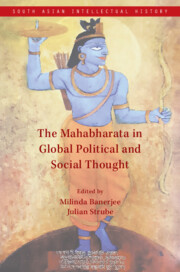Book contents
- Frontmatter
- Contents
- Acknowledgements
- A Note on Transliteration
- Introduction
- 1. The Mahabharata and the Making of Modern India
- 2. ‘Epic’ Past, ‘Modern’ Present: The Mahabharata and Modern Nationalism in Colonial Western India
- 3. The Bhagavadgita and the Gandhian Hermeneutic of Non-Violence: Globalizing Selfless Action
- 4. A Nostalgia for Transcendental Closure: The Relationship between the Mahabharata and Notions of Nationalism in the Works of Friedrich Schlegel, Maithilisharan Gupt, and Jawaharlal Nehru
- 5. The Production and Deconstruction of the ‘Ideal Indian Woman’ on the Basis of the Mahabharata in the Twentieth and Twenty-First Centuries
- 6. Rethinking Transnational Intellectual History and Epic Nationalisms through Lithographic Labour: Persian and Urdu Mahabharatas in India and Iran
- 7. ‘Philosophical Poetry’ or a ‘Failed Beginning’? A Metaphilosophical Enquiry into Wilhelm von Humboldt’s and G. W. F. Hegel’s Perspectives on the Bhagavadgita
- 8. East Asian Uses of Indian Epic Literature: Refractions of the Mahabharata in Japan and China, Late Nineteenth–Early Twentieth Century
- 9. The Reception of the Mahabharata in Siam: Evolving Conceptions of Kingship
- 10. Understanding Global Intellectual Exchanges through Paratexts: Wadiʿ al-Bustani’s Introduction to His Arabic Translation of the Mahabharata
- About the Contributors
- Index
Introduction
Published online by Cambridge University Press: 31 August 2024
- Frontmatter
- Contents
- Acknowledgements
- A Note on Transliteration
- Introduction
- 1. The Mahabharata and the Making of Modern India
- 2. ‘Epic’ Past, ‘Modern’ Present: The Mahabharata and Modern Nationalism in Colonial Western India
- 3. The Bhagavadgita and the Gandhian Hermeneutic of Non-Violence: Globalizing Selfless Action
- 4. A Nostalgia for Transcendental Closure: The Relationship between the Mahabharata and Notions of Nationalism in the Works of Friedrich Schlegel, Maithilisharan Gupt, and Jawaharlal Nehru
- 5. The Production and Deconstruction of the ‘Ideal Indian Woman’ on the Basis of the Mahabharata in the Twentieth and Twenty-First Centuries
- 6. Rethinking Transnational Intellectual History and Epic Nationalisms through Lithographic Labour: Persian and Urdu Mahabharatas in India and Iran
- 7. ‘Philosophical Poetry’ or a ‘Failed Beginning’? A Metaphilosophical Enquiry into Wilhelm von Humboldt’s and G. W. F. Hegel’s Perspectives on the Bhagavadgita
- 8. East Asian Uses of Indian Epic Literature: Refractions of the Mahabharata in Japan and China, Late Nineteenth–Early Twentieth Century
- 9. The Reception of the Mahabharata in Siam: Evolving Conceptions of Kingship
- 10. Understanding Global Intellectual Exchanges through Paratexts: Wadiʿ al-Bustani’s Introduction to His Arabic Translation of the Mahabharata
- About the Contributors
- Index
Summary
Shri Krishna was a politician without parallel – accomplished as providence in building and dissolving empires – hence conceived to be the incarnation of God…. His aim was not merely to make the Pandavas [the] sole master. His aim was the unity of India.
—Bankimchandra Chattopadhyay, ‘Krishnacharitra’, 1875In the Mahabharata a very definite attempt has been made to emphasize the fundamental unity of India…. That war was for the overlordship of India … and it marks the beginning of the conception of India as a whole, of Bharatvarsha.
—Jawaharlal Nehru, The Discovery of India, 1946The speech of the Mahabharata is same as ambrosia In every era, it is interpreted in new ways Interpreted in ever new ways.
—Shaoli Mitra, ‘Nathavati Anathavat’, 1983Arguably, the Mahabharata is India's most influential political text. Kautilya's Arthashastra may seem a close contender, but it never attained the epic's social depth and was, in any case, forgotten for a millennium before its rediscovery in 1905. The Constitution of India certainly plays a more important role in shaping the modern Indian state, but, as a text, it hardly permeates popular consciousness in the way the Mahabharata does. For over two millennia, the Mahabharata has shaped Indian politics. It has nourished the statecraft of Hindu rajas and Mughal emperors, stirred anti-colonial nationalism and peasant rebellion, moulded Dalit–Bahujan and feminist activism. Beyond India, it has profoundly shaped political cultures across Southeast Asia, inspired pan-Asian thinking in China and Japan, activated the philosophical imagination of European and Arab thinkers, and conversed with Iranian nationalism.
Like one of its protagonists, the divine statesman Krishna, the Mahabharata exists in multiple avatars. The Sanskrit text, ascribed to Vyasa, coexists with versions in several Indian and extra-Indian languages. For many decades now, scholars have written about these textual traditions as well as about the popular appeal of Mahabharata stories. Historians, anthropologists, religious studies scholars, and philosophers have all written about the epic. Admittedly, much more has been said about the pre-modern lives of the Mahabharata than about its modern incarnations – but even on the latter the scholarship is rich and growing.
In this milieu, why is a new book needed about the epic? We offer two compelling reasons. First, there exists no single volume that engages with the Mahabharata's role in shaping modern social, political, and religious thought.
- Type
- Chapter
- Information
- Publisher: Cambridge University PressPrint publication year: 2025

